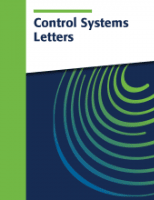
IEEE Control Systems Letters
Scope & Guideline
Connecting Theory with Practical Applications.
Introduction
Aims and Scopes
- Control Theory and Applications:
The journal covers a broad spectrum of control theory, including linear and nonlinear control, adaptive control, robust control, and optimal control techniques, which are applicable to various engineering and technological systems. - Data-Driven Control:
A significant area of focus is on data-driven control strategies that leverage machine learning, statistical methods, and real-time data for system optimization and decision-making. - Networked and Distributed Control Systems:
Research related to the control of networked systems, including multi-agent systems, decentralized control, and communication constraints, is a core area of exploration. - Safety-Critical Control Systems:
The journal emphasizes the development of safety-critical control systems, incorporating methodologies that ensure system stability and safety under various operating conditions, including fault tolerance and cyber-physical systems. - Emerging Technologies and Applications:
The journal includes studies on the application of control techniques in emerging fields such as robotics, autonomous systems, smart grids, and biomedical systems, reflecting the interdisciplinary nature of modern control engineering.
Trending and Emerging
- Machine Learning and AI in Control:
There is a significant rise in publications integrating machine learning and artificial intelligence into control strategies, reflecting the growing importance of data-driven decision-making. - Control Barrier Functions:
Research on control barrier functions is gaining momentum as a critical tool for ensuring safety and robustness in control systems, particularly in applications involving autonomous systems. - Cybersecurity in Control Systems:
The focus on cybersecurity measures in control systems is increasingly relevant, as the need to protect against cyber threats in networked and automated environments becomes paramount. - Distributed and Cooperative Control:
An increasing number of studies are exploring distributed and cooperative control strategies for multi-agent systems, emphasizing the need for collaborative approaches to complex system management. - Stochastic and Robust Control Techniques:
Emerging trends indicate a growing interest in stochastic and robust control methods that address uncertainties and enhance system performance in variable environments.
Declining or Waning
- Traditional Control Techniques:
There seems to be a waning interest in classical control techniques that do not integrate modern computational methods or data-driven approaches, as more researchers pivot to innovative methodologies. - Single-Agent Systems:
Research focusing solely on single-agent control systems is becoming less common, with a growing emphasis on multi-agent and distributed systems that better reflect real-world applications. - Linear Control Systems:
The focus on purely linear control systems appears to be diminishing, as there is a trend towards exploring nonlinear dynamics and adaptive control strategies that can handle complex system behaviors. - Static Control Approaches:
Static approaches to control design, which do not consider time-varying or dynamic adjustments, are becoming less prevalent, as the field increasingly recognizes the importance of adaptability and responsiveness.
Similar Journals
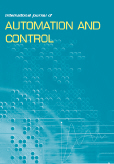
International Journal of Automation and Control
Transforming Industries: Insights and Innovations in Control and Systems Engineering.Welcome to the International Journal of Automation and Control, a vital platform for research and discussion in the fields of Control and Systems Engineering, Hardware and Architecture, Industrial and Manufacturing Engineering, and Software. Published by InderScience Enterprises Ltd since 2007, this journal has gained recognition for its high-quality articles and innovative approaches, holding Q3 rankings in its primary fields and a commendable Q2 designation in Industrial and Manufacturing Engineering. While offering a robust mix of theory and practical applications, it aims to bridge the gap between academia and industry, fostering advancements in automation technologies. Researchers, professionals, and students will find invaluable insights and critical analysis that contribute to the evolving landscape of automation and control systems. Although currently not open access, the journal provides a comprehensive archive until 2024, ensuring accessibility to groundbreaking research that shapes the future of engineering. Join a community dedicated to exploring the challenges and achievements in automation and control.
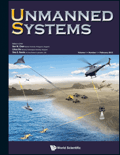
Unmanned Systems
Unveiling Breakthroughs in Unmanned Systems TechnologyUnmanned Systems is a leading academic journal published by WORLD SCIENTIFIC PUBL CO PTE LTD based in Singapore, that serves as a premier platform for research and advancements in unmanned vehicle technology. Covering a broad range of disciplines, the journal ranks in the Q1 category for Aerospace Engineering, Automotive Engineering, Control and Optimization, and Control and Systems Engineering as of 2023, showcasing its high impact within these fields. With impressive Scopus rankings placing it in the top tiers of its categories—8th in Control and Optimization and 14th in Aerospace Engineering—Unmanned Systems stands out as a vital resource for researchers, professionals, and students eager to explore current trends and innovations. While the journal operates under a traditional access model, it remains committed to disseminating quality original research, reviews, and case studies that contribute significantly to the understanding and application of unmanned technologies from 2013 through 2024.
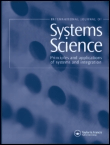
INTERNATIONAL JOURNAL OF SYSTEMS SCIENCE
Innovating Through Theoretical and Practical InsightsThe INTERNATIONAL JOURNAL OF SYSTEMS SCIENCE, established in 1970 and published by Taylor & Francis Ltd, stands at the forefront of research in the domains of Computer Science Applications, Control and Systems Engineering, and Theoretical Computer Science. With an impressive H-index and consistently ranked in the Q1 category across its relevant fields for 2023, this journal serves as a vital resource for researchers, practitioners, and students alike. It holds significant impact in the academic community with Scopus rankings placing it in the 86th percentile for Theoretical Computer Science and the 83rd percentile for Control and Systems Engineering. The journal's commitment to disseminating high-quality research fosters innovation and collaboration, making it an essential platform for advancing knowledge and application in systems science. Readers can access a wealth of articles that delve into both theoretical explorations and practical applications, thereby contributing to the ongoing dialogue in this dynamic field.
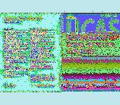
INTERNATIONAL JOURNAL OF CONTROL AUTOMATION AND SYSTEMS
Innovating Systems Engineering for a Smarter Tomorrow.INTERNATIONAL JOURNAL OF CONTROL AUTOMATION AND SYSTEMS is a distinguished scholarly journal published by the Institute of Control Robotics & Systems in collaboration with the Korean Institute of Electrical Engineers. Since its inception in 2003, the journal has contributed significantly to the domains of Control and Systems Engineering and Computer Science Applications, attaining a commendable Q2 ranking in both fields as of 2023, thereby positioning itself at the forefront of academic inquiry and innovation. With an ISSN of 1598-6446 and an E-ISSN of 2005-4092, this journal serves as a platform for disseminating cutting-edge research and advancements in control automation technologies. Although it operates under a subscription model, the journal maintains a high impact factor, underscoring its relevance and appeal to researchers, engineers, and students alike who seek to expand their knowledge and apply theoretical insights in practical scenarios. We invite you to explore and contribute to the ongoing discourse that shapes the future of automation and control systems.
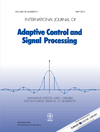
INTERNATIONAL JOURNAL OF ADAPTIVE CONTROL AND SIGNAL PROCESSING
Pioneering Research in Adaptive Control and Signal ProcessingINTERNATIONAL JOURNAL OF ADAPTIVE CONTROL AND SIGNAL PROCESSING, published by Wiley, is a premier peer-reviewed journal dedicated to the advancing field of adaptive control and signal processing. With a consistent publication history since 1987, this journal serves as a critical platform for disseminating innovative research and developments that contribute to both theoretical and practical aspects of engineering disciplines, specifically within the realms of control systems, electrical engineering, and signal processing. Boasting a commendable impact with quartile rankings in Q2 for Control and Systems Engineering, Electrical and Electronic Engineering, and Signal Processing, it ranks #93 among 321 journals in Control and Systems Engineering with a 71st percentile in Scopus rankings, underscoring its significance in fostering academic excellence. Although it does not offer open access, the journal is accessible through institutional subscriptions and individual purchases, promoting an extensive reach to researchers, professionals, and students eager to stay at the forefront of adaptive technologies. Whether seeking to explore cutting-edge methodologies or to gain insights into real-world applications, readers will find this journal to be an invaluable resource in the dynamic landscape of engineering innovation.
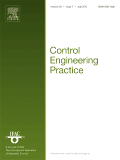
CONTROL ENGINEERING PRACTICE
Connecting Scholars and Practitioners in Control EngineeringCONTROL ENGINEERING PRACTICE is a premier journal published by PERGAMON-ELSEVIER SCIENCE LTD that has established itself as a critical platform for the dissemination of cutting-edge research in the fields of Applied Mathematics, Computer Science, Control and Systems Engineering, and Electrical and Electronic Engineering. With an impressive impact factor and classification in the top Q1 quartile across its categories as of 2023, this journal enjoys a rank of #18 out of 635 in Applied Mathematics and is recognized for its robust scholarly contributions, making it an invaluable resource for academics and practitioners alike. Spanning nearly three decades from 1993 to 2024, it aims to bridge theoretical advancements and practical applications, offering readers insights into novel control techniques and system practices. Although it does not currently offer open access, it remains accessible through academic institutions and libraries. Researchers, professionals, and students seeking to keep abreast of the latest developments in control engineering will find this journal an essential companion in their academic and professional journeys.
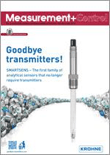
MEASUREMENT & CONTROL
Empowering Research Through Precision and InsightMEASUREMENT & CONTROL is a prominent journal published by SAGE PUBLICATIONS LTD, dedicated to advancing the fields of applied mathematics, control systems, and instrumentation. With an ISSN of 0020-2940 and an E-ISSN of 2051-8730, this open-access journal has been serving the academic community since 1968, ensuring that essential research findings are accessible to all. As of 2023, it is recognized within the Q3 quartile of Scopus rankings in key categories including Applied Mathematics, Control and Optimization, and Instrumentation, highlighting its relevance in an ever-evolving scientific landscape. The journal not only fosters high-quality research but also encourages the exchange of innovative ideas and techniques, making it an essential resource for researchers, professionals, and students alike. With a focus on the latest advancements and methodologies, MEASUREMENT & CONTROL remains a vital platform for disseminating knowledge and fostering collaboration within these interdisciplinary fields.

Mechatronic Systems and Control
Connecting Engineering Disciplines for Cutting-edge SolutionsMechatronic Systems and Control is a prestigious journal published by ACTA PRESS, dedicated to the advancing fields of mechatronics, control systems, and their various applications. Established in 2018, this journal serves as a vital platform for researchers and professionals to disseminate innovative findings that bridge the gap between mechanical engineering, electronics, computer science, and control systems. With an ISSN of 2561-1771 and an E-ISSN of 2561-178X, it operates from Canada’s vibrant academic environment, specifically from Calgary, Alberta. Although it is indexed in lower quartiles in 2023 in the fields of Computer Science Applications and Control and Systems Engineering, it presents an opportunity for emerging scholars to contribute and enhance their visibility in this interdisciplinary field. As a strictly non-open access journal, Mechatronic Systems and Control provides subscription-based access which ensures high-quality content delivery. This journal is instrumental for those pursuing advancements in technological convergence and represents an essential resource for academics and students alike seeking to understand the complexities of modern control systems.

International Journal of Dynamics and Control
Integrating Theory and Practice in Control EngineeringInternational Journal of Dynamics and Control, published by SPRINGERNATURE, is a prestigious academic journal aimed at advancing the fields of Civil and Structural Engineering, Control and Optimization, Electrical, Electronic, and Mechanical Engineering, as well as Modeling and Simulation. With an ISSN of 2195-268X and an E-ISSN of 2195-2698, this journal focuses on high-quality research that addresses complex dynamic systems and control methodologies essential for innovation and progress in engineering disciplines. The journal has achieved significant recognition, being ranked in the second quartile for multiple categories in 2023, which underscores its impact and relevance within the academic community. Although it operates under subscription access, its rigorous peer-review process ensures that published articles meet the highest standards of scientific excellence. Researchers, professionals, and students alike will find valuable insights and methodologies that inform their work and inspire future studies in dynamic systems and controls.
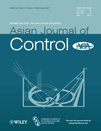
ASIAN JOURNAL OF CONTROL
Driving Innovation in Control EngineeringWelcome to the Asian Journal of Control, an esteemed publication in the fields of Control and Systems Engineering as well as Electrical and Electronic Engineering, published by WILEY. With a continuous convergence from 2000 to 2024, this journal serves as a vital platform for researchers, professionals, and students, offering high-quality peer-reviewed articles that drive innovation and advancement in various control strategies and systems. The journal is renowned for its rigorous academic standards, reflected in its impressive Scopus rankings, with a percentile of 90th in Mathematics (miscellaneous) and 67th in Engineering Control and Systems. Although it does not currently offer open access, the Asian Journal of Control remains an indispensable resource for those looking to push the boundaries of knowledge in engineering disciplines. With its Q2 category ranking in both relevant fields, the journal is poised to influence future research and applications, making it a must-read for those invested in the evolving landscape of control technologies.